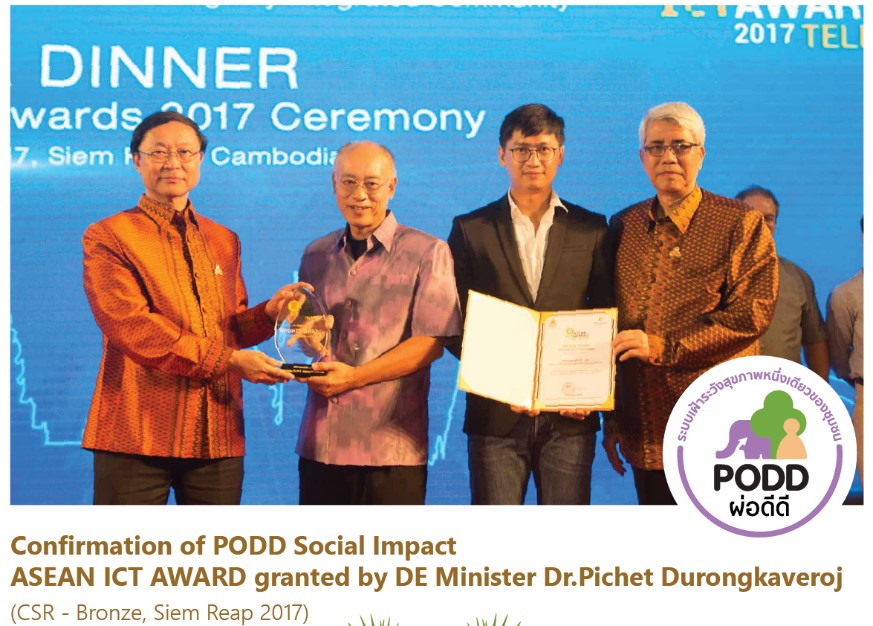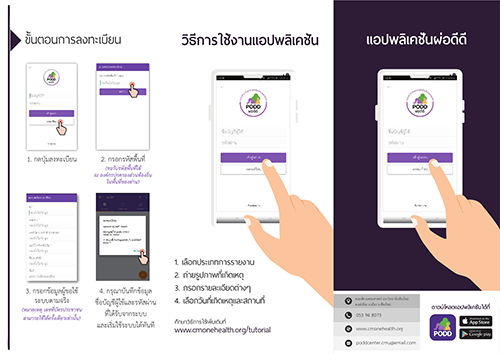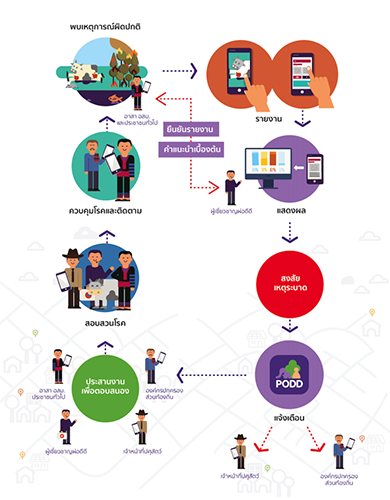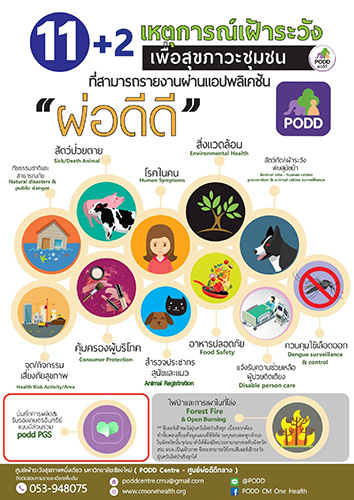CMU PODD
In 2014 a Chiang Mai University research department was tasked to develop an application to support one of the government’s many Thailand 4.0 aspirations. To that end, PODD was developed - A Community-owned One Health Surveillance System for Early Detection and Rapid Response to Stop Outbreak, Avert Pandemics and Minimise Disaster.
This prescient application was developed for the use of volunteer health officials on local levels to be able to alert, detect and pass on critical information so that a rapid response to health crises such as communicable diseases amongst animals, people and even national disasters can be responded to immediately and effectively. All that was required was a smartphone, thousands of volunteers and basic training.
Associate Professor Dr. Lertrak Srikitjakarn, Director of PODD Centre, Chiang Mai University

Winner of the Corporate Social Responsibility (CSR) category from the Ministry of Digital Economy and Society at the ASEAN ICT AWARDS 2017 at Siem Reap, Cambodia
Associate Professor Dr. Lertrak Srikitjakarn, Director of PODD Centre, Chiang Mai University, is an epidemiologist and also a founding director of Veterinary Public Health Centre for Asia Pacific, with research interests in zoonoses control (infectious diseases that jumps from a non-human animal to humans. Zoonotic pathogens may be bacterial, viral or parasitic, or may involve unconventional agents and can spread to humans through direct contact or through food, water or the environment.) In 2014 PODD received support from the Skoll Global Threats Fund (SGTF), or today’s Ending Pandemics Foundation, and the university, along with a company called Open Dream, together developed this application which draw data from relevant news and notices to share with volunteers and officials on a grass roots level with the aim of facilitating rapid response.
“Right after we developed this platform we encountered a problem with fowl cholera,” said Associate Professor Dr. Lertrak. “It was a motorbike mechanic in Fang with no knowledge of chickens who alerted us. Once he had concerns, he logged onto the application where information was provided as to what signs to look out for and each and every step clearly explained for him to do. The system is set up so that the right authorities on the local, provincial and national levels are alerted to a problem immediately when needed. Three months later there were reports that 100 cows had died in Hod District. Each cow costs 40,000 baht. The villagers later said that they cared for thousands of cows around Doi Tao lake, and this had always been a normal loss. However, with the application we were alerted and went to investigate, finding that there was a Clostridium perfringens bacteria which was preventable by vaccines. This has solved a long running problem. In the days before the application this new would be sent to the one public health official in the district and the matter may be sitting on a desk for a long while before it is addressed. This bypasses those steps.”

PODD functions

Reporting functions of PODD
To date, PODD has been used effectively around 300 times in 30 provinces across Thailand mainly for; 1. Rabies and dog bites, 2. Dengue control, 3. Animal diseases, 4. Oversight of any contagious diseases in the population, 5. Reporting and prevention of fires, 6. Environment oversight, 7. Protection of consumers, 8. Safe and hygienic food, 9. Risky locations or activities, 10. Natural disasters, 11. Report on ill patients, 12. Control of stray cat and dog numbers.

“There was one case which really highlighted the application’s effectiveness,” said Associate Professor Dr. Lertrak. “At around 11pm one night in Utaithani province, an alert popped up on the application that there was a dengue patient. Traditionally the director of the local hospital would then send a fax to the district office, which would then send a fax to the Health Promotion Hospital which would then send a fax to the President of the Provincial Administrative Office, all of this would have taken five to ten working days. Instead the application immediately alerted the president who sent a staff out to investigate. The app showed a 100 metre radius around the home of the patient and indicated how many households were in the radius. This allowed for immediate fumigating of the hot spot to get rid of potential dengue carrying mosquitos, thereby ending a problem before it began.”
The application has proven so successful that a PODD PGS is being developed to tailor it for agricultural use to help farmers set organic standards.
“For me, the great pride is in the fact that we use the basis of pure science to develop technology that is used by everyday people for their own benefit. The results are proven.”
The application has come in play during this year’s pandemic, with local volunteers able to identify, for instance, people who have crossed over illegally from Myanmar, reporting them to authorities so that they can get tested of the COVID-19 virus before there is any possible contamination.